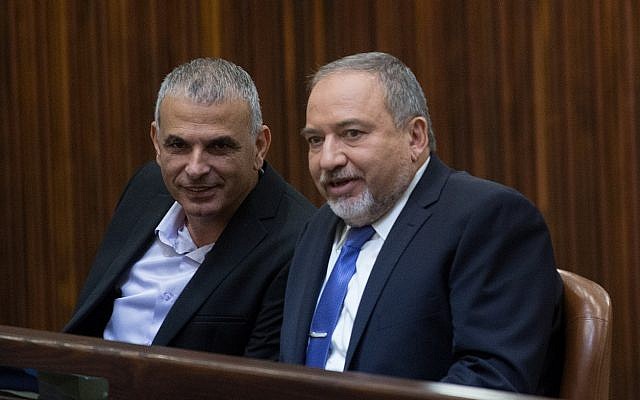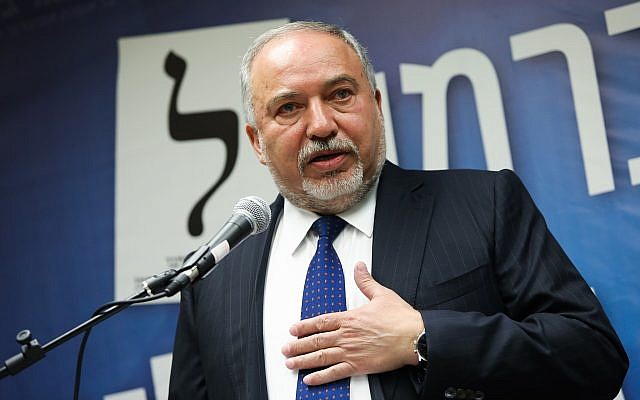Likud party sources reportedly claim PM considering coalition without Liberman’s Yisrael Beytenu by fielding just 60 of the Knesset’s 120 MKs — but Kahlon opposes the idea

As potential coalition partners continue to dig in their heels preventing any significant progress in talks to form a new government, and with time running out for him to finalize a deal, Prime Minister Benjamin Netanyahu was reported Thursday to be looking at forming a government of just 60 lawmakers, half of the Knesset total.
The non-majority government would be formed without the Yisrael Beytenu Party led by Avigdor Liberman, the Yedioth Ahronoth daily newspaper reported, citing sources within the Likud party.
Just under two weeks before the final deadline for Netanyahu to submit a coalition to the Knesset, talks appear to have stalled, and no agreement has been signed with any party. Without reconciling the conflicting demands of Yisrael Beytenu and the ultra-Orthodox parties, as well as the other factions likely to join, Netanyahu will be unable to achieve a coalition of at least 61 seats in the 120-member Knesset.
While the establishment of a minority or non-majority government right after parliamentary elections would be unprecedented in Israel, it is theoretically possible. The new government must receive majority support in the Knesset, but need not obtain the approval of a supermajority of 61 or more.
Likud sources believe that even if Liberman does not join the government, he would not actively vote against it and risk being blamed for forcing new elections, the report said. Instead, Yisrael Beytenu’s five MKs could abstain in any confidence votes, leaving the coalition with a simple majority of 60 to 55, but still remaining in the opposition.
Netanyahu’s Likud has previously said that the secularist, hawkish Liberman has demanded more than his fair share of control over ministries and government policies — given his party’s paltry five Knesset seats — including the defense minister post, a more secularist religion-and-state stance, and a more combative posture toward Hamas in Gaza.
Meanwhile, the Kulanu party led by Moshe Kahlon, the finance minister in the outgoing government — in which he controlled 10 Knesset seats — is now seeking to hold on to the job despite his party shrinking to just four seats, and has refused to conclude his coalition talks with Likud.

Kahlon has told close confidants that he will not agree to be the finance minister in a government of just 60 MKs as it will be too weak and the treasury would face unrealistic demands from each party in the coalition, Haaretz reported Thursday. Kahlon also repeated his stipulation that he will only sign a coalition agreement after he has seen the financial demands of all the other member parties, and reached an understanding with Netanyahu on which can be met.
A key sticking point in coalition talks is Liberman’s demand that no changes be made to a bill regulating the draft of ultra-Orthodox men into the army. The bill, which passed a first reading in the Knesset during the previous parliament, is opposed by ultra-Orthodox parties who want to make alterations in the legislation to reduce the quotas of those who would be called up for national service.
The Walla website reported Wednesday the ultra-Orthodox United Torah Judaism party handed over to Likud negotiators a form of agreement to the issue of army induction with sources saying it was “a very serious softening” of their demands.
“The ball is now in the hands of the Likud but it seems that the Likud representatives are being held captive by Avigdor Liberman and he is stiffening his stance and endangering the next right-wing government,” a UJT source said.
According to the report, an afternoon meeting between UTJ and Likud was put off for the second time this week due to differences of opinion within the ultra-Orthodox party about the conscription bill.
On Wednesday evening Netanyahu complained that the task of forming a coalition seemed “absurd,” accusing potential coalition partners of making excessive and conflicting demands during negotiations.

A senior official from Yisrael Beytenu rejected accusations that the party was holding up coalition negotiations, telling the Israel Hayom daily in a report Thursday that “there is something odd going on here.”
“There is no progress, we aren’t starting to sign things and they [Likud] aren’t giving us answers, there is total uncertainty in the negotiations. The nature of things is usually to get along, but we will not blink,” the official was reported to warn.
In the coalition talks, Liberman laid out five core demands he said were his party’s red lines, including the defeat of Hamas, blocking any changes to proposed legislation regulating military conscription for ultra-Orthodox men, and ending certain despised practices employed by some in the state rabbinate when dealing with Russian-speaking immigrants, such as DNA tests to examine Jewish family ties.
If Netanyahu fails to form a coalition by May 28, the task could be assigned to a different member of the Knesset. If no member of the legislature is likely to be able to form a government, the country could then face new elections.
As reported by The Times of Israel
